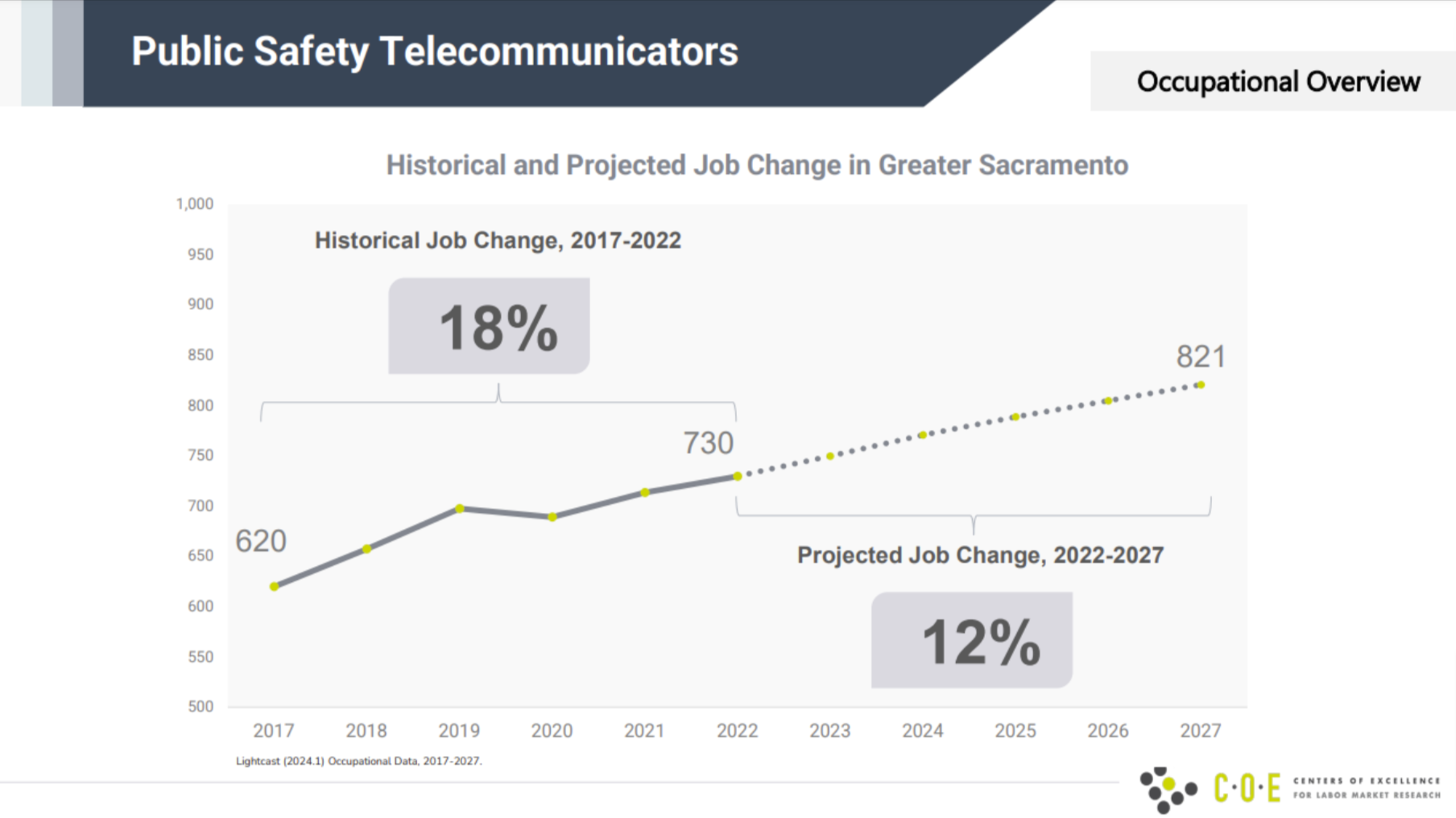Accessing Dispatcher Jobs in Greater Sacramento: Opportunities Unlocked
On April 4th, Valley Vision, in collaboration with the region’s community colleges, hosted a virtual discussion to address the critical need for public safety dispatchers in the Greater Sacramento region. The conversation explored training opportunities, recruitment strategies, and the challenges individuals face in entering this high-paying, middle-skill profession. Labor market data indicates a 12% project job change rate for public safety dispatchers in the Greater Sacramento region. The profession offers not only job security but also competitive wages, with entry-level dispatcher wages in Sacramento exceeding $59,000 annually, while the median salary for dispatchers is $72,758.

The advisory’s keynote speaker, Jennifer Dwyer, Staff Services Manager from the Commission of Peace Officer Standards and Training (POST), explained the required curriculum for peace officer dispatchers in a keynote address at the employer advisory. She explained that the current curriculum is under review by the Office of Administrative Law for needed updates. After approval, there will be an increase in the Basic Training requirement from 120 to 160 hours, and Continued Professional Training (CPT) will be introduced, ensuring ongoing professional development for dispatchers during their careers.
Despite the demand for skilled dispatchers, entering the field can be confusing. While the minimum education qualification is a high school diploma, in order to take most courses to become a dispatcher, individuals must be hired by a public safety agency to be admitted into a program. Many individuals want to take the POST course before being hired, however most agencies send employees to training only after placement. Presently, the only community college program offering POST training to non-affiliated individuals relatively near the Greater Sacramento Area is the South Bay Regional Training Consortium, with a staggering four-year waitlist.

In addition to the certificate training required, the role of a public safety dispatcher requires a unique combination of human-centered, and tech-forward skills. As we learned from our panel including Sacramento Police Department, City of Roseville Police Department, Placer County Sheriff, and Sacramento Regional Fire and EMS, dispatchers must be proficient in traditional methods such as map reading and report writing, while also being adept at using modern technologies such as GPS programs and coding. One common skills gap identified among all employer panelists was the ability to multitask efficiently. Dispatchers are required to handle a variety of tasks simultaneously, including answering phone calls, managing radio transmissions, operating computer systems, and more, all while remaining calm and focused. The panelists agreed, that effective communication skills are essential for dispatchers to handle stressful conversations with callers and quickly gather important information. In addition, dispatchers must be able to make logical and quick decisions in high-pressure situations. A combination of excellent communication skills, the ability to be emotionally supportive, and technological competency are necessary to excel in these positions.
Historically, the public safety dispatcher profession has been predominantly female, with women making up 71% of the workforce. While this reflects the profession’s accessibility and appeal to women, efforts are underway to broaden marketing strategies to encourage a more diverse representation of talent to apply for these positions. By diversifying the talent pool, we can ensure that the profession more accurately reflects the communities it serves.
Increasing access to training and promoting diversity within the public safety dispatcher profession are essential steps in meeting the critical demand for skilled dispatchers in the Greater Sacramento region to address our emergency response needs. By working collaboratively with education and industry partners, we can ensure that individuals from all backgrounds have the opportunity to pursue and excel in this rewarding career path.
This advisory was funded by Los Rios Community College District through Strong Workforce Program funds and the Capitol Region Workforce Boards through Regional Planning Implementation funds.




